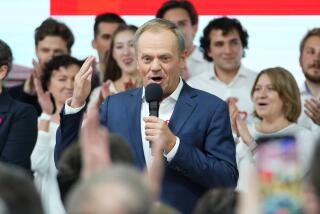Lithuania’s Ex-Communist Boss Is Upset Victor
- Share via
MOSCOW — Lithuania’s former Communist leader, a maverick who wants closer ties with Russia without sacrificing his country’s independence, regained influence as his new party captured a big bloc of parliamentary seats, according to election returns released Monday.
In a stunning rebuff to their current leader, Vytautas Landsbergis, only 21% of voters cast ballots for the ruling Sajudis Movement, which spearheaded Lithuania’s secession drive.
Reportedly disgusted at the Sajudis campaign tactic of “unmasking” opponents as supposed KGB collaborators, voters turned to Algirdas Brazauskas, a burly 60-year-old veteran politician who engineered the Lithuanian Communist Party’s break from Moscow in 1990.
“Sajudis made a big mistake in acting very much like the old Communists used to,” Vitas Matulevichu, moderator of a political television show, said in a telephone interview from Vilnius, Lithuania’s capital. “They accused their opponents of working with the KGB or being Communists, or, if they couldn’t document anything, of simply having ‘Red sympathies.’ Criticizing those who think independently isn’t right, and the people noticed.”
Brazauskas’ Democratic Labor Party--a coalition of moderate former Communists who favor slowing reform in economically shattered Lithuania--won 45 of the 84 seats filled in Sunday’s balloting, according to preliminary unofficial returns. Sajudis appeared to have won about 20, with the remainder going to various other centrist groups.
In the remaining 57 districts where no single candidate earned a majority, runoffs are to be conducted on Nov. 8.
Although the Brazauskas-led coalition seems certain to control Parliament, the future path of Lithuanian politics may depend on an upcoming, still-unscheduled presidential election.
By a narrow margin, voters on Sunday approved a new Lithuanian constitution that creates the powerful post of president, to be elected by direct popular vote. Under the new constitution, which squeaked by with 55% approval, the 141-member Parliament must call a presidential election within four months.
Both Landsbergis, a music historian, and Brazauskas have hinted they will run. Some analysts have suggested that the race could be close, as voters may be reluctant to give former Communists control of both the legislature and the executive.
During the parliamentary campaign, the Democratic Labor Party attracted strong support in rural regions by promising to halt or reverse the agrarian reforms that broke up sprawling, state-owned collective farms but failed to provide a safety net for peasants left to fend for themselves for the first time in five decades.
More to Read
Sign up for Essential California
The most important California stories and recommendations in your inbox every morning.
You may occasionally receive promotional content from the Los Angeles Times.










